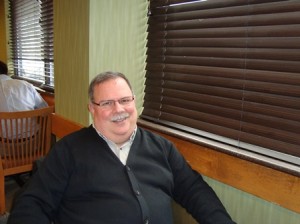By Lori Berkey, Contributing Writer

Westborough – It was “Friday the 13th” June of 1997 when Steve Winer, of Westborough, heard news that “scared the living daylights” out of him. He found out his 11-year-old daughter, Allison, had been diagnosed with type 1 diabetes. Soon, a neighbor he hardly knew knocked on his door. Someone had told the woman about the diagnosis and she came to tell the Winer family that her daughter also has type 1.
The neighbor offered to share information about how their family coped. Steve was relieved to have a personal connection with someone who knew how to live with the disease. Her assistance greatly augmented the medical information doctors provided.
“One of the things my wife and I found,” Steve said, “is that parents of kids with type 1 knew a heck of a lot more than doctors, just about the day-to-day management (not the medical side) but little things, like “if you have an insulin pump and you'se going to the prom, where do you hide it in the dress?””
Steve was working in the Internet field when Allison was diagnosed, and the neighbor's kindness inspired him to try to use the Internet to link other families with personal support. He established contacts through online chat rooms and organized a group to start an online volunteer family support service in connection with the nonprofit organization, JDRF (formerly named Juvenile Diabetes Research Foundation). The service began in 2002.
According to Steve, about eight people gained support upon start-up, and the number has since grown to about 27,000 one-to-one connections worldwide. Both Steve and Allison serve as volunteers with about 135 others. Steve is among 10 moderators who are “on-call” a few days each month matching requests with appropriate support connections.
Steve learned how major the difference is between type 1 and type 2 diabetes, and what's needed to manage Allison's condition.
“Type 1 impacts people's lives every minute of the day,” he said, “You'se getting ready to go to the grocery story, “oh wait a minute, my blood sugar's low, I can's go yet”… “we'se going out to dinner – I have to make sure that everything is in place.” When you travel, you have to make sure you have all your supplies. You never can forget about it.”
Steve said that when Allison was diagnosed, her type was called “juvenile diabetes,” but the name has since been changed to type 1 (also referred to as T1D) to eliminate the misconception that adults are not affected. A large percentage of people with type 1 are not juveniles, and some have had the disease for 35 years.
“My daughter is 27 now, she's not real happy with being called a juvenile, as I would imagine,” he said, adding that JDRF eliminated “Juvenile” from the organization's name in recognition of the issue, but continues to use the original acronym because their work remains highly recognized by it.
JDRF helps fund type 1 research.? Research advances have enabled Allison to wear an insulin pump that provides an ongoing supply in lieu of frequent injections. The local JDRF division, the Bay State branch of the New England chapter, offers seminars, support groups, parent coffees, educational programming, governmental affairs, and school-related help.
The Winer family is determined to fight until there's a cure. For the last 17 years, Steve, his wife, Lori, and Allison have walked annually in the Walk to Cure Diabetes as part of the team, “Allie's Allies.” Cumulatively, the team has raised about $75,000 to $80,000 for research, per Steve's tally.
For online support, visit www.jdrf.org, and click the “Get Support” button. To volunteer, click the same spot, and send a message offering to help.













